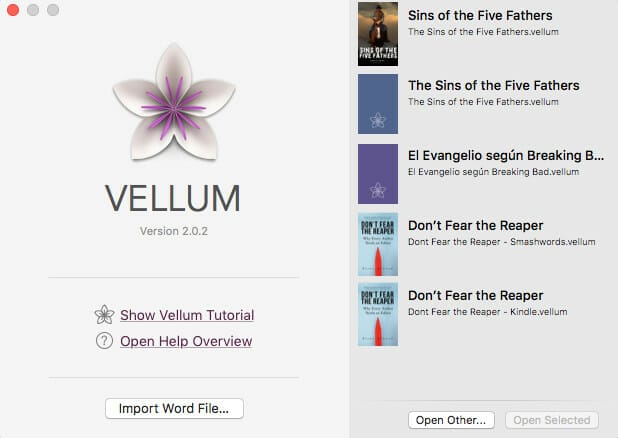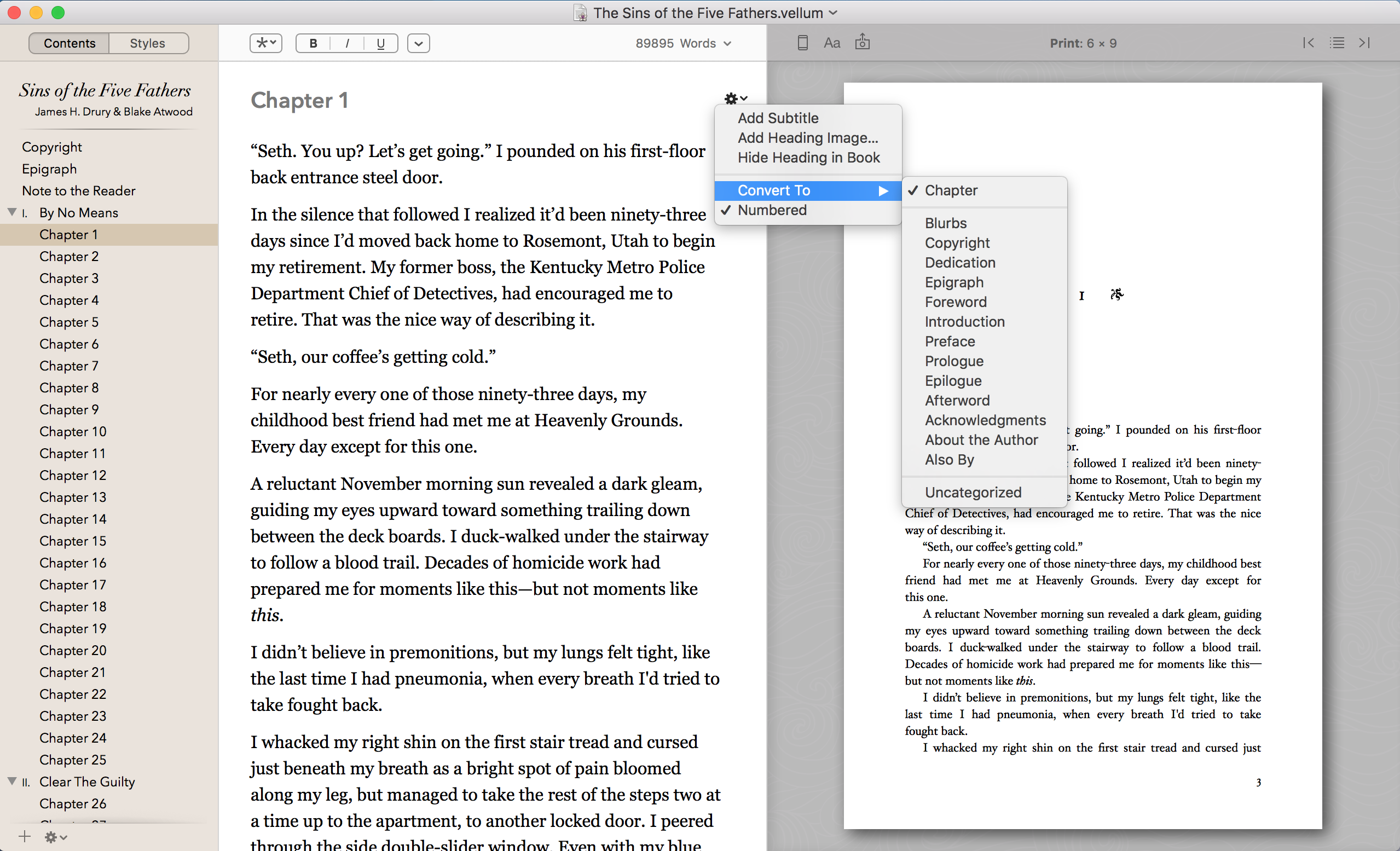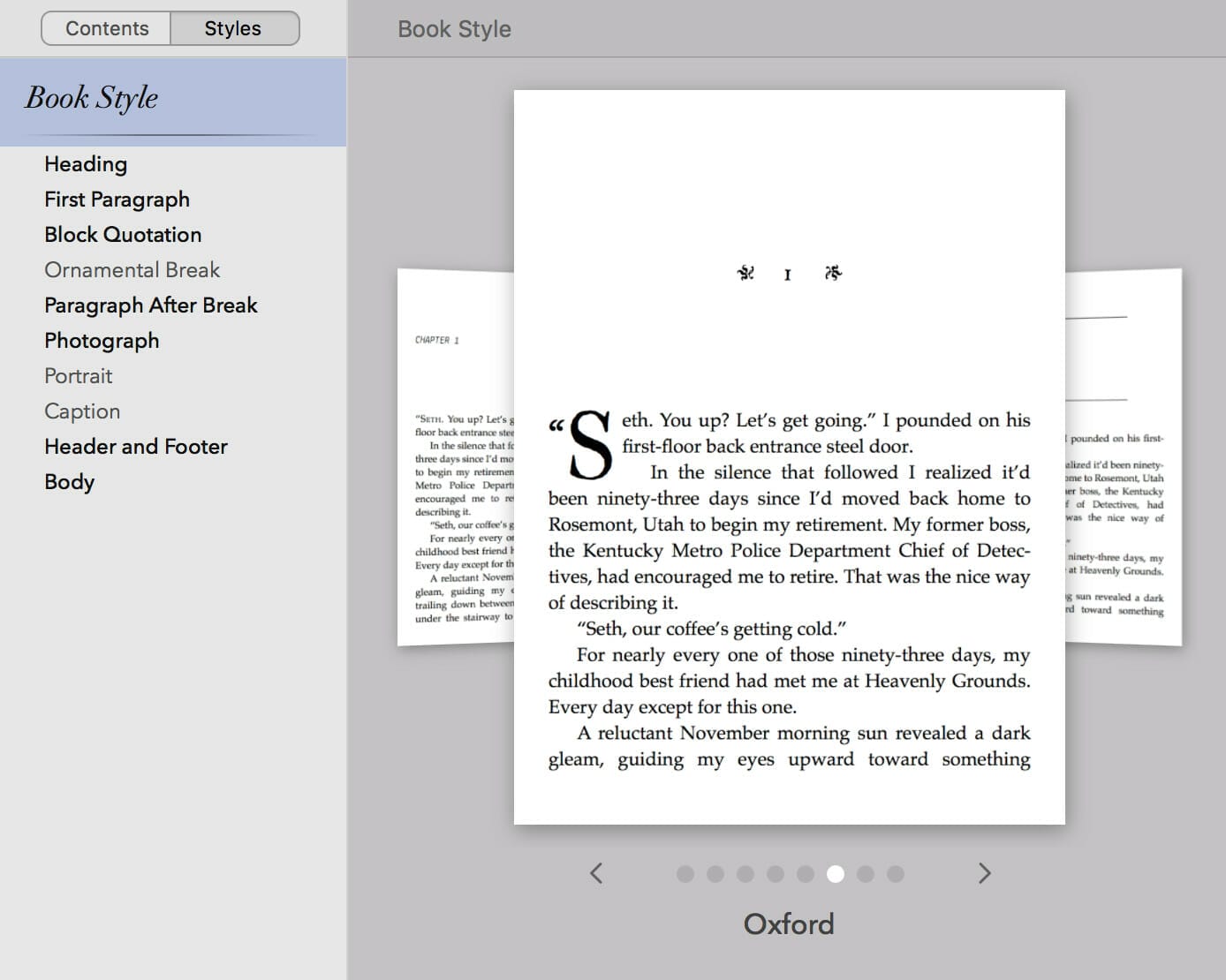Whenever a fellow writer or client asks me what I use to create ebooks or print editions, my first question is always, “Mac or PC?”
It’s not my intention to raise my elitist, Apple-shaped nose at them. Rather, their response dictates my answer. PC users get the hard answer: “Have you considered switching to a Mac?”
I’m kidding, but only slightly. The comparative ease with which Vellum 2.0, a Mac-only product, creates ebooks and print editions should make all PC authors consider making the switch…or at least befriending one Mac user who’ll let them borrow their computer for an hour.
I may be overselling Vellum, but for my money, which I’ve gladly given them on multiple occasions, they have released an app that marries ease of use with fantastic design — both of the app itself and of the ebooks and print editions it’s capable of creating.
Here’s my review of Vellum software for self-publishers.
Editorial note: There is a new book formatting software in the market, Atticus, which does what Vellum does, but is $103 cheaper and works for all computers, not just Macs. So keep that in mind. And if you want to read a full review of Atticus, here it is.
Book formatting software and other options
Those who have yet to experience the joy of using Vellum are relegated to choosing from among a few time-consuming or costly processes:
- Hire a professional book designer for both your ebook and print edition layouts, which can cost into the thousands of dollars depending on the intricacy or complexity of your layouts. If you have the money, this is the way to go, especially if you’ve vetted the interior designer. Their experience is worth the expense, but not all writers or self-publishers can afford such costs, and particularly if they plan to release multiple titles.
- Upload a Word document to Kindle Direct Publishing or the affectionately known “meatgrinder” at Smashwords and hope for the best. (And then try not to pull your hair out.)
- Learn the intricacies of Calibre, a powerful piece of ebook software that’s more usable by programmers than authors.
- Learn to lay out your own book in Adobe InDesign, a powerful desktop publishing app that gives you the finest of control over your design. Unfortunately, it also requires dozens of hours to master and a monthly subscription to an app you may only use intermittently.
I’ve tried each of these, whether with my books or those I’ve helped clients create. Each one has its shortcomings, either in too much time wasted seeking design perfection or too much money spent waiting for a designer to finally finish the book.
So I’m going to share a better option with you. Yes, there’s a better way to DIY your self-published book!
While I’d used Vellum to create ebooks before, the release of Vellum 2.0 introduced a game-changing feature: print formatting.
Now, the time and expense I have to invest in creating stellar books are, at the very least, halved.
What is Vellum software?
Vellum is a book-formatting software. You can use it to create beautiful ebooks and print books that you can sell anywhere, including Amazon.
The opening screen of Vellum is straightforward.
I can click on an already existing project or import a Word file. For this review, we’ll be looking at Sins of the Five Fathers, a posthumous mystery novel written by my uncle that I self-published with him.

By clicking on Sins of the Five Fathers, I’m taken to the book creation screen:

Clicking on any item in the left-hand sidebar reveals a new page to edit in the center area. With the book title selected, I can edit the book’s metadata. Clicking on “Ebook Cover” at the top of the center area allows me to drag and drop the ebook’s cover into the book.
When a user incorporates Word’s styles into their manuscript, such as always using the “Title” style in Word for each of the author’s chapter titles, Vellum is smart enough to know to import each of those chapters as separate chapters. Even when Vellum isn’t quite smart enough to figure out every section or chapter, reorganizing and renaming each part, section or chapter is a breeze.
For instance, by clicking on the configuration icon next to a chapter header, I can easily convert the chapter into a number of other predefined chapter types, e.g., Prologue, Epilogue, Afterword, About the Author, etc.

The “Styles” panel in the upper left provides multiple templates for the layout of specific aspects of a book, e.g., Heading, First Paragraph, Block Quotation, etc.
In future releases, I’d like to see more granular control of these aspects and the ability to save customized templates. But, I believe the provided templates provide enough variation to satisfy any author seeking to create a traditionally formatted book.

Adding text features is just as easy. Right-clicking within the text brings up a context-aware menu that allows you to add features like Subheads, Ornamental Breaks, Images, Alignment Blocks (for right-justified, left-justified or centered text) and more.

Lastly, the most powerful aspect of Vellum is its exporting capabilities.
I learned the intricacies (and sometimes maddening nuances) of exporting my first book via Scrivener. By far, Scrivener is still my preferred word processor — this article was written in Scrivener — but its exporting capabilities are almost too powerful. It can be overwhelming and time-consuming for most authors to attempt.
In my opinion, this is where Vellum shines.
By going to the top menu and selecting “File > Generate Books,” I can choose which file types and trim size I’d like to export to. As you can see below, ebook options include Kindle (.mobi), iBooks, Nook, Kobo, Google Play, and Generic EPUB.
For print, Vellum offers a variety of popular trim sizes:
- 5 x 8 inches
- 5.25 x 8 inches
- 5.5 x 8.5 inches
- 6 x 9 inches
- 5.06 x 7.81 inches
- 5.5 x 8.25 inches
They offer additional trim sizes for international books, mass market paperbacks and large print.

The proof of any ebook formatting software is in, well, the proof. Here are a few images of the Createspace print edition proof of Sins of the Five Fathers:


What about Vellum for windows?
Unfortunately, the company only makes Vellum for Mac; there’s no PC version.
If you’re looking for a Vellum equivalent for windows, you might consider Scrivener.
While I prefer the ease of Vellum for book formatting, Scrivener provides a similar service, as well as many more features.
How much does Vellum cost?
Vellum software is an investment.
It costs $199.99 to create unlimited ebooks or $249.99 to create unlimited ebooks and paperbacks.
But it’s worth the cost, especially if you’re planning to write, format and publish multiple books over your writing career. Compare this to the options I offered at the start of this post, and you can see why it’s worth considering!
Of course, more features abound, but what I’ve shared in this brief review are the features I’ve used the most. I’ve been quite pleased with Vellum, and it’s now become an integral part of my publishing process.
This post contains affiliate links. That means if you purchase through our links, you’re supporting The Write Life — and we thank you for that!
This is an updated version of a story that was previously published. We update our posts as often as possible to ensure they’re useful for our readers.








